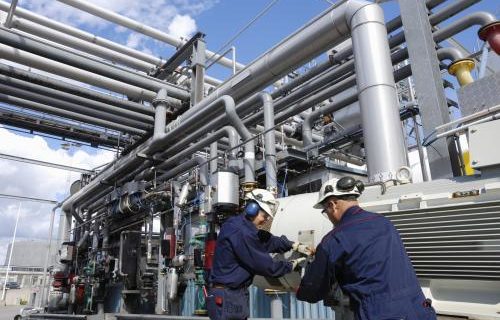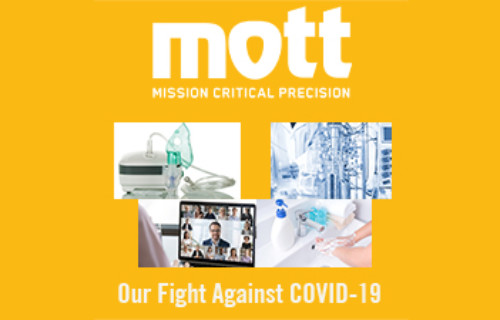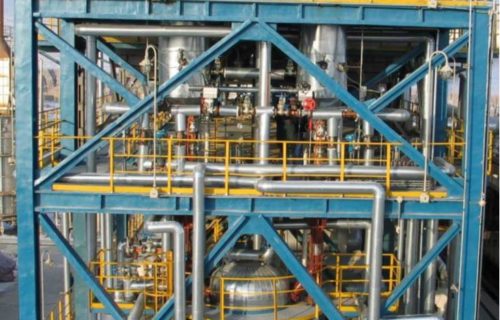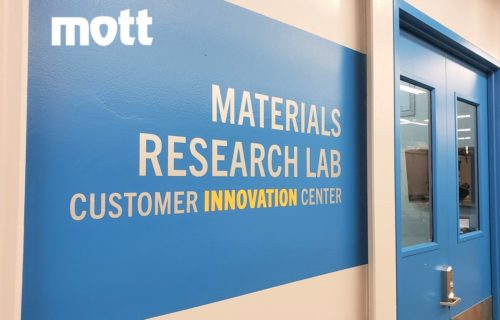Sintered Alloy Filter Elements
Mott manufactures porous metal filter elements in a broad range of materials, sizes, and fittings, making them easily specified with the characteristics and configurations customers require for their specific filtration needs. We can incorporate custom features or create completely original porous metal filter element designs for specialized needs, ensuring that each solution perfectly matches the application it’s intended for. Mott’s porous metal filter elements are also available in a variety of alloys, each offering unique benefits and suitability for different application purposes, from chemical processing to gas filtration. Our porous metal filter elements are a popular choice for many industrial filtration applications due to their exceptional heat, corrosion, and physical wear resistance, providing reliable and effective filtration under the most demanding conditions.
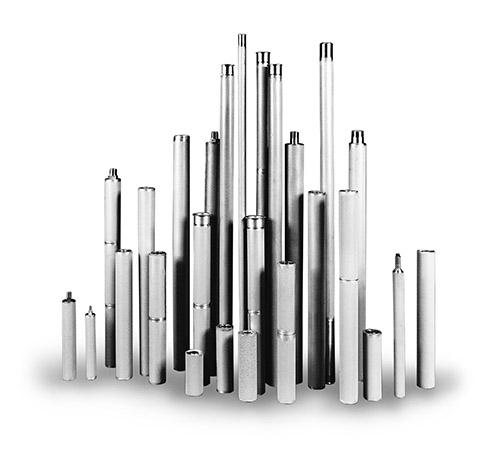
Questions? Call 860.747.6333 Today!
Literature & Data Sheets
Typical Applications
- FCC/RFCC Refining
- Petrochemicals (ex. Needle Coke)
- High temperature or corrosive chemical processing
- Ultra-pure chemicals requiring sub-micron filtration
- Hot gas processes (ex. Waste to energy plants)
Filter Elements Overview
Explore the features and benefits of Mott sintered porous metal media for superb filtration efficiency, structural integrity and uniform porosity.
Catalyst Filtration
Catalyst Recovery Filtration Application Brief Installation Examples. LSI, LSM, LSX Filters
Filter Feasibility Testing
Filter feasibility testing, application analysis, testing laboratory for liquid and gas filtration processes.
Lab and Engineering Services
Discover our entire range of services, including rapid prototyping, filter feasibility, media characterization and more.
Explore Mott's Capabilities
Provides an overview of markets served, applications, products, materials, and engineering capabilities.
Product Specs
| Dimensions |
Length – 6” to 120” Standard Diameters – 1”, 1.5”, 2”, 2.5”, 2.75”, 3” Wall Thickness – .039” to .093” (Dependent on media grade) Custom options are available, consult factory |
|---|---|
| Material Choices |
Standard filter and hardware alloys – 316L SS, 310 SS, Hastelloy® C-276, Hastelloy® X, Monel® 400, Nickel 200, Inconel® 600 Other alloys are available, consult factory |
| Connections |
Open end connections – Various NPT, straight tube, O-ring assemblies, compression, and flange connections available Blind end connections – Various end caps, hex nut assemblies, and bayoneted options available Custom options available, consult factory |
| Media Grades |
Nominal pore sizes available – 0.2, 0.5, 2, 5, 10, 20, 40, 100 Custom options available, consult factory |
| Cleaning |
Mott LSI and GSV filters are designed for clean-in-place performance, meaning filter elements can discharge cake build-up without having to open the filter for maintenance. Once a terminal pressure drop has been reached, the cleaning cycle automatically initiates to discharge cake build-up through gas assisted pulse or manually through a backwash cycle. Particles will embed in the filter media over time, requiring the elements to be cleaned by a third-party company. Various cleaning techniques can be used to prolong life of the elements. For a recommendation of a cleaning company, please contact a Mott representative. It is recommended you keep a spare set of filter elements to continue operations while elements are being cleaned. |
Videos & Articles
Design Capabilities
Depending on your needs, Mott can provide just the sintered alloy filter elements, a vessel and elements, or provide you a full turnkey system with the vessel, frame, piping, instruments, and controls. Our expertise in creating sintered alloy filter elements allows us to offer solutions that meet the specific requirements of various industrial applications, ensuring high performance and durability under demanding conditions.
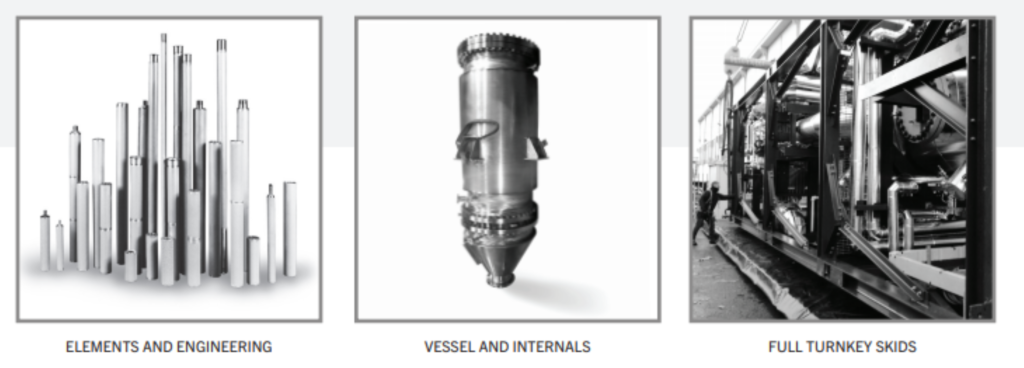
Relevant Services
Destructive Element Analysis – Send us one of your porous metal filter elements for various analyses to determine the remaining lifetime and filtration efficiency of your filters. This service helps identify when a replacement is necessary and ensures your system continues to operate at peak performance.
Filter Feasibility Testing – Want a recommendation on the correct filter media, alloy, and backwash frequency for your process? Coordinate with a Mott representative to send a sample of your feedstock to our lab to determine the correct filtration design for your process, specifically focusing on the selection and implementation of porous metal filter elements.
Preventative Maintenance Cycles – Consult with a Mott representative about utilizing a pre-determined lab testing and cleaning schedule to avoid costly downtime. Regular maintenance is key to the longevity and effectiveness of porous metal filter elements in any application.
Engineering Support – Utilize our expert project engineers to design the right porous metal filter elements to maximize flow and particle capture. Our team is dedicated to providing innovative solutions that enhance the efficiency and reliability of your filtration system.
Superior Filtration with Porous Metal Filter Elements
Mott’s porous metal filter elements represent the pinnacle of filtration technology, designed to meet the stringent requirements of diverse industrial applications. These elements are crafted from high-quality metals through a sintering process that creates a robust, porous structure capable of removing particles at the micron level. Ideal for applications requiring high strength, thermal resistance, and chemical compatibility, our porous metal filter elements ensure exceptional performance in filtering gases and liquids. Their versatility and durability make them an essential component in sectors ranging from chemical processing to pharmaceuticals, offering reliable filtration solutions that enhance efficiency and protect critical equipment.
FAQs: Porous metal filter elements
Q: What are porous metal filter elements?
A: Porous metal filter elements are advanced filtration devices made from sintered metal that contain thousands of tiny, interconnected pores. These filters are designed to trap and remove particulate matter from gases and liquids, offering high durability, excellent resistance to high temperatures and corrosive environments, and the ability to withstand differential pressures.
Q: How do porous metal filter elements work?
A: Porous metal filter elements work by allowing fluid to pass through the tiny pores while trapping particles on the surface or within the depth of the porous structure. The size of the pores can be precisely controlled during manufacturing, enabling the filtration of particles down to sub-micron levels, depending on the specific application requirements.
Q: What are the advantages of using porous metal filter elements?
A: The advantages of using porous metal filter elements include high mechanical strength, resistance to thermal shock and corrosion, long service life due to durability and the ability to be cleaned and reused, and high filtration efficiency for both gases and liquids. They are particularly beneficial in harsh operating conditions where other filter materials might fail.
Q: Can porous metal filter elements be customized?
A: Yes, porous metal filter elements can be customized in terms of material, pore size, shape, and size to meet specific filtration requirements. Customization allows for optimal performance in various applications, including chemical processing, pharmaceutical manufacturing, food and beverage production, and more.
Q: How are porous metal filter elements maintained?
A: Maintenance of porous metal filter elements typically involves backflushing, ultrasonic cleaning, or chemical cleaning to remove trapped particles. Their ability to be cleaned and reused makes them a cost-effective solution for many industrial processes. Regular maintenance ensures the longevity and efficiency of the filtration system.
Q: Where are porous metal filter elements commonly used?
A: Porous metal filter elements are commonly used in a wide range of industries, including chemical and petrochemical processing, pharmaceuticals, food and beverage, oil and gas, and water treatment. They are ideal for applications requiring high purity filtration, catalyst recovery, gas-liquid separation, and aeration.
